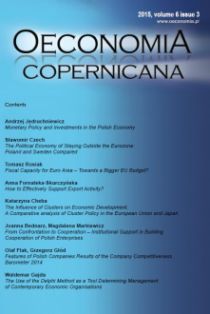The Influence of Clusters on Economic Development. A Comparative analysis of Cluster Policy in the European Union and Japan
The Influence of Clusters on Economic Development. A Comparative analysis of Cluster Policy in the European Union and Japan
Author(s): Katarzyna ChebaSubject(s): Economy, National Economy, Supranational / Global Economy, Business Economy / Management
Published by: Instytut Badań Gospodarczych
Keywords: cluster; effectiveness of clusters; regional development; value of regions
Summary/Abstract: The development of clusters seems to be a natural consequence of the observed trends in the global economy. The increased interest in the creation and development of clusters can also be seen in most of the countries of the European Union, however, the experience of EU countries in this field is different. In addi-tion to strong clusters with a long tradition, new clusters are created with much lower potential. Clusters compatible with the most important EU documents are to play the role of organizations supporting regional development and ensuring the growth of innovation of the European Union in the new programming period. The Japanese economy is based on the important role of clusters in this area, which along with the US and the European Union is among the largest economies in the world. The experience of Japan in this area is much longer. A lot of still functioning clusters were created in this country in the XVII and XVIII centuries. The aim of this study is a comparative analysis of the socio-economic situation of the European Union and Japan, with special emphasis on the role that clusters play in those economies. The result of the analysis is to identify the factors that allow for the effective operation of enterprises within created cluster structures. The analysis of Japan's experience in this area is a valuable source of information for policy guidelines developed to support clusters in the EU.
Journal: Oeconomia Copernicana
- Issue Year: 6/2015
- Issue No: 3
- Page Range: 73-88
- Page Count: 16
- Language: English

